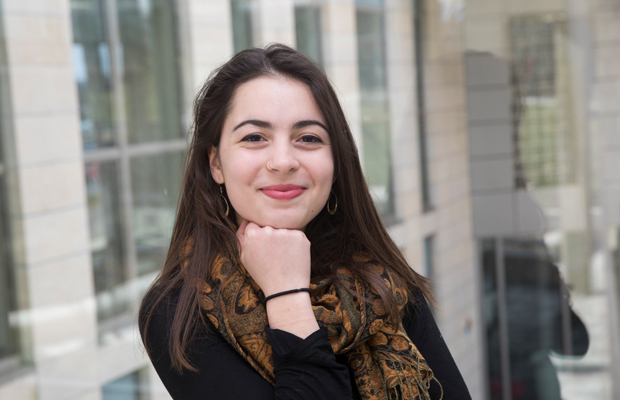
Researcher probes alcohol’s effect on immune system
Jamie Mondello is looking into the learning processes surrounding alcohol and how the drug affects our immune response.
The Binghamton senior wants to see if an environmental cue associated with intoxication, such as a scent, could alter the immune response.
Research shows that our immune system can learn to respond to a stimulus that didn’t initially cause a response, a process known as immune conditioning. These stimuli can either blunt the immune response or enhance it, which has several applications such as suppression of the immune response after organ transplant surgery.
“Immuno-conditioning has been shown for other drugs like heroin, but it is uncommon to see studies involving conditioning of the alcohol response,” says Mondello, an integrative neuroscience major.
Alcohol is the most commonly used drug in the U.S., with 71 percent of Americans saying they consumed alcohol in 2014. Alcohol addiction affects millions of people worldwide. How does the body adapt in the presence of alcohol, and what makes it so hard to abstain?
Mondello says small amounts of alcohol have been shown to suppress the immune response. This makes ethanol (alcohol) an unconditioned stimulus (US). In her research, she uses a lemon-scented substrate as an environmental stimulus, which may function as a conditioned stimulus (CS). Successful immuno-conditioning, meaning the immune response would be suppressed by the lemon-scented substrate alone, would reveal major insights about alcohol cravings.
Intrigued by a class on drugs and behavior during her sophomore year, Mondello leaped at an opportunity to work with Terry Deak, professor of psychology at Binghamton. His is one of the few research labs looking into the physiological effects of drug conditioning as opposed to the more studied area of behavioral conditioning.
Mondello says she attributes much of her growth as a scientist to Anny Gano, who recently completed her doctorate, and Andrew Vore, a doctoral student, also in Deak’s lab.
“Jamie loves science and she loves learning, and that kind of attitude benefits everyone in the lab,” Vore says. “She has contributed in the design of a study from the ground up, both in the logic justifying the hypotheses and also in crafting an effective design to answer the questions she set forth.”
Mondello, who completed a summer internship at the National Institutes of Health in 2016, says she is carrying over the lab techniques and planning skills she learned there.
In her free time, Mondello loves cooking and trying new recipes. “I noticed I was setting up my kitchen like I would set up my lab for PCR,” she says, laughing.
Growing up on Hastings-on-Hudson, Mondello always loved science. She plans to pursue a doctorate in neuroscience, following in the footsteps of her grandmother, who has a doctorate in psychology.
“There are a lot of strong women figures in my family,” she says, “and that always inspired me.”







